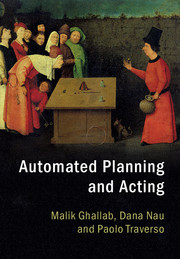Book contents
- Frontmatter
- Dedication
- Contents
- List of Algorithms
- Table of Notation
- Foreword
- Preface
- 1 Introduction
- 2 Deliberation with Deterministic Models
- 3 Deliberation with Refinement Methods
- 4 Deliberation with Temporal Models
- 5 Deliberation with Nondeterministic Models
- 6 Deliberation with Probabilistic Models
- 7 Other Deliberation Functions
- 8 Concluding Remarks
- Appendix A Search Algorithms
- Appendix B Strongly Connected Components of a Graph
- Bibliography
- Index
2 - Deliberation with Deterministic Models
Published online by Cambridge University Press: 05 August 2016
- Frontmatter
- Dedication
- Contents
- List of Algorithms
- Table of Notation
- Foreword
- Preface
- 1 Introduction
- 2 Deliberation with Deterministic Models
- 3 Deliberation with Refinement Methods
- 4 Deliberation with Temporal Models
- 5 Deliberation with Nondeterministic Models
- 6 Deliberation with Probabilistic Models
- 7 Other Deliberation Functions
- 8 Concluding Remarks
- Appendix A Search Algorithms
- Appendix B Strongly Connected Components of a Graph
- Bibliography
- Index
Summary
Having considered the components of an actor and their relation to the actor's environment, we now need to develop some representational and algorithmic tools for performing the actor's deliberation functions. In this chapter, we develop a simple kind of descriptive model for use in planning, describe some planning algorithms that can use this kind of model, and discuss some ways for actors to use those algorithms.
This chapter is organized as follows. Section 2.1 develops state-variable representations of planning domains. Sections 2.2 and 2.3 describe forward-search planning algorithms, and heuristics to guide them. Sections 2.4 and 2.5 describe backward-search and plan-space planning algorithms. Section 2.6 describes some ways for an actor to use online planning. Sections 2.7 and 2.8 contain the discussion and historical remarks, and the student exercises.
STATE-VARIABLE REPRESENTATION
The descriptive models used by planning systems are often called planning domains. However, it is important to keep in mind that a planning domain is not an a priori definition of the actor and its environment. Rather, it is necessarily an imperfect approximation that must incorporate trade-offs among several competing criteria: accuracy, computational performance, and understandability to users.
State-Transition Systems
In this chapter, we use a simple planning-domain formalism that is similar to a finitestate automaton:
Definition 2.1. A state-transition system (also called a classical planning domain) is a triple Σ= (S,A, γ) or 4-tuple Σ = (S,A, γ, cost), where
• S is a finite set of states in which the system may be.
• A is a finite set of actions that the actor may perform.
• γ : S × A → S is a partial function called the prediction function or state transition function. If (s, a) is in γ 's domain (i.e., γ (s, a) is defined), then a is applicable in s, with γ (s, a) being the predicted outcome.Otherwise a is inapplicable in s.
• cost : S × A → [0,∞) is a partial function having the same domain as γ. Although we call it the cost function, its meaning is arbitrary: it may represent monetary cost, time, or something else that one might want tominimize. If the cost function isn't given explicitly (i.e., if Σ = (S,A, γ)), then cost(s, a) = 1 whenever γ (s, a) is defined.
Information
- Type
- Chapter
- Information
- Automated Planning and Acting , pp. 19 - 73Publisher: Cambridge University PressPrint publication year: 2016
